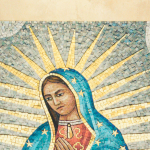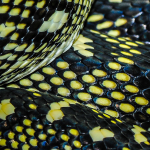Reader, she killed me.
It was a spring day like any other: balmy, of an imponderable sweetness. It was the sort of day one believes in oneself and one’s erratic notions, truly believes that the dreams one had in the night will now come true. Dreams which, until this moment, seem undeserved, too grand. But since you ask, I had dreamt of an excess of goodness. Dawn agitated me. And so I, Hector “Jewel” Diptera, decided to leave the monastery.
I confess, I had given myself the fancy nickname, “Jewel,” after gazing at my own twinkling reflection in a pond. My pedigree also deserves mention, for I was born lame in a compost heap, yet did not know my mother, and my father was the father of all. Being orphaned I was not cherished, and being greedy I was always hungry and guilty for that hunger and my thirst. You see, I was a loner.
My heart was sullied early on. First there were the taunts and threats of those lunatics claiming to be my brothers. These were jaded houseflies.
Fool! they said.
Then there was an episode with the monastery dog, in whose jaws I nearly perished.
Fool! they said again, for they were experts in such things.
Despite my bad leg, I was plucky. I rode the air currents up along the stone wall then drifted down inside the coolness of the chapel. In the refectory the monks were praying, praying. I picked over a slice of rye bread and a lettuce leaf, then swooped into an untended bowl. I was enjoying the split pea soup’s queer taste when a large shadow loomed above me.
Suddenly: a rough sleeve. It stung, to be sure, but I was all right. Yes, a brief scan assured me that my main wings and halters and antennae were still intact. Being superstitious, I felt glad of this, but not too glad. Soon, though, I was parading over the monk’s bald head. So this is what he sees from on high, I thought. So this.
From the refectory’s cloying warmth I flew into the pantry, where the remains of a ginger cookie lay in a pool of milk. After I had my fill, I ventured into the still of the courtyard. There I reflected on my worth and felt a knot of shame. It seemed incongruous that I should be given so much but that I should take so little. I was startled into flight by the clanging bells of evensong.
It was time. The horizon beckoned. I went toward what I hoped was freedom.
Beyond the garden gate.
The barn.
The railroad tracks.
I did not know where I was. All was a mystery, my alighting here and there a dance of despair, the words for dear life kept flitting through me, passing blown field, toll plaza, I was like a knight errant but with no memory of where I was meant to go except away.
The city was full of promises. Yet I felt homesick for the monastery’s gruel. Never was I so desperate for the ordinary than in this flashing beating filthy place. I hung in the air conflicted before spiraling down. In an alleyway I searched bin after glorious bin. Here was a fine sardine laid out specially for me.
O Fortuna!
Then I noticed a black spider weaving its web in a window. I came nearer, seduced by the pattern and intending to pay my compliment.
Next I knew, I was struggling with gossamer veils as a duplicitous gaze shone upon me.
At such times a blissful force reminds one of the perilousness of one’s own goodness. I was good because only meaning to flatter the spider I had instead made myself prey, and though I wished to emulate the monks’ generosity I was no saint, not even a man for that matter, I was lowly. My sense of worthlessness had the surprising effect of making me strong. I bucked. This released me from the sticky trap and I landed, quite by chance, on a vane of cardboard.
Where is he? … Dead? … Sleeping? It was the demon spider muttering to himself as he darted back and forth.
A better question might have been: Who is he? Truth was raining down in little thuds. I felt so clear. Then I feverishly took wing. I rose in wild circles, buzzing.
Saved, I thought proudly.
I began to wonder if I should not return to the monastery, where it was safe and I could live forever. But there were star-pricks on my wings now, which proved I had traveled to the heart of something bigger than myself. And still, I was so hungry.
I found a paper cup filled with the melancholy scent of coffee. I followed the red marks along the rim.
A beautiful lady appeared. Or rather, I appeared to her. The majesty of attraction is that it affirms the misguided dissatisfaction of the morbidly curious. We stared, each at the other, and into the other as well. The rattle of her jewels was a music to me, which I had not heard before and would never hear again. Her hand was swift and pale.
…
Biography
Ulrica Hume is the author of An Uncertain Age, a “wickedly sophisticated” spiritual mystery novel, and House of Miracles, a collection of socially relevant tales. Her flash fiction appears at Fanzine, Necessary Fiction, 100 Word Story, and in the Nothing Short Of anthology. Find her at ulricahume.com / Twitter @uhume.
Image: unsplash.com





